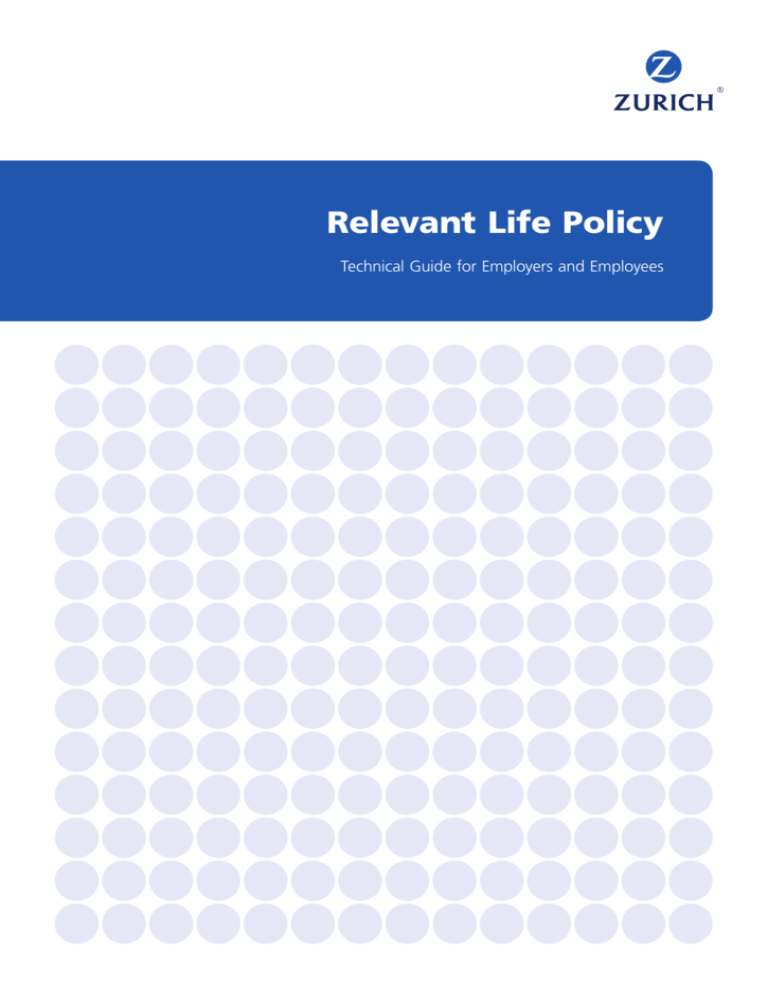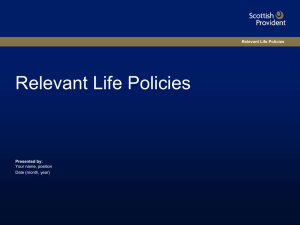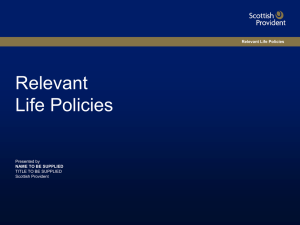Relevant Life Policy | 710902
advertisement

Relevant Life Policy Technical Guide for Employers and Employees What is a Relevant Life Policy? A Relevant Life Policy: • is a term assurance effected by an employer on the life of an employee and funded by the employer • provides for a lump sum benefit payable either on death or the diagnosis of a terminal illness of the employee during their employment and before age 75 • provides no other benefits and does not have a surrender value at any time • is effected by the employer subject to a special Relevant Life Policy Trust • is designed to meet the criteria for a “single life” Relevant Life Policy set down in sub-sections 393B(4) (b) and (c) of the Income Tax (Earnings and Pensions) Act 2003 (ITEPA 2003). Background note It is well known that registered pension schemes provided by employers benefit from special tax concessions. Post “A-day”, 6 April 2006, employers can also set up unregistered schemes. Such schemes are generally taxed as employer-financed retirement benefits schemes (EFRBS) unless they provide “excluded benefits”. The latter include benefits under a Relevant Life Policy (see below). Most Relevant Life Policies are set up as excepted group life policies, i.e. for a group of employees. However, it is also possible to set up a policy which satisfies similar conditions but provides cover for only a single individual. The statutory conditions that need to be satisfied for a policy to qualify as a Relevant Life Policy are covered in the next section. To be taxed as an EFRBS a policy must provide “relevant benefits”. The benefits paid under a Relevant Life Policy are not treated as relevant benefits for these purposes and so a Relevant Life Policy is not taxed in the same way as an EFRBS (section 393B ITEPA 2003). Employer payments into most EFRBS are now subject to the disguised remuneration tax rules which will result in a tax liability on the employee based on the employer contribution. Fortunately this tax legislation excludes employer contributions to a Relevant Life Policy from taxation on the employee under the disguised remuneration tax rules. 2 The statutory conditions for a Relevant Life Policy To be a Relevant Life Policy under section 393B(4)ITEPA 2003, a policy must be: a) an excepted group life policy as defined in section 480 of the Income Tax (Trading and Other Income) Act 2005 (ITTOIA 2005), or b) a policy of life insurance the terms of which provide for the payment of benefits on the death of a single individual and with respect to which: i) condition A in section 481 of that Act would be met if paragraph (a) in that condition referred to the death, in any circumstances or except in specified circumstances, of that individual (rather than the death in any circumstances of each of the individuals insured under the plan) and if the condition did not include paragraph (b), and; ii) conditions C and D in that section and conditions A and C in section 482 of that Act are met, or c) a policy of life insurance that would be within paragraph (a) or (b) but for the fact that it provides for a benefit which is an excluded benefit under or by virtue of paragraph (a), (b) or (d) of subsection 3 (of ITEPA section 393B). The relevant conditions to be met for a single life insured policy to be a Relevant Life Policy are: • under the terms of the policy a capital sum is payable or arises on the death in any circumstances of the insured person under the age of 75 • the policy does not have and is not capable of acquiring a surrender value • no sums or other benefits may be paid under the policy except those prescribed; and • any sums payable or other benefits arising under the policy must be paid to or for, or conferred on, or applied at the direction of: a) an individual or charity beneficially entitled to them, or b) a trustee or other person acting in a fiduciary capacity who will secure that the sums or other benefits are paid to or for, or conferred on, or applied in favour of an individual or charity beneficially. The provision of a terminal illness benefit is possible as such a benefit is an excluded benefit within section 393B(4)(c) ITEPA 2003. This provides that apart from a death benefit another benefit that can be provided is an ill health or disablement benefit for an employee during service. There is an additional condition in section 482 ITTOIA 2005 that must be satisfied for a policy to be a Relevant Life Policy. This states that tax avoidance must not be the main purpose, or one of the main purposes, for the policy holder (the employer) or any person beneficially entitled under the policy. The Zurich Relevant Life Policy which we will refer to in this guide as a plan, satisfies all of the above conditions. The advantages of a Relevant Life Policy • The death benefit (including terminal illness benefit) will not form part of the employee’s pension lifetime allowance • Subject to satisfying the “wholly and exclusively” test, premiums paid by the employer can be treated as a business expense for tax purposes • Premiums paid by the employer are not treated as a benefit in kind for, or otherwise taxable on, the member (life assured) • The premiums paid do not form part of the employee’s annual allowance i.e. the amount that can be contributed by or on behalf of an individual to any registered pension scheme with the benefit of tax relief • Premiums are not assessable on the employee for national insurance contribution purposes • Any benefit payments are free of income tax • While the death benefit is payable through a discretionary trust and this is subject to the rules relating to “relevant property”, generally it will be paid free of inheritance tax and will not form part of the employee’s estate for inheritance tax purposes. When is a Relevant Life Policy suitable? • A Relevant Life Policy is suitable for those employers who, perhaps because of the smaller size of their business, do not wish to set up group arrangements for all their employees or who wish to provide additional death benefits to be paid through a discretionary trust on the death of specific individual employees to their families. • A Relevant Life Policy is also suitable when the employer wishes to provide tax efficient additional benefits to existing death in service arrangements. When is a Relevant Life Policy not suitable? A Relevant Life Policy will not be suitable if: • The life to be insured is not an employee • It is intended to provide benefits beyond age 75 and beyond the period of employment • It is intended to provide benefits other than just death and terminal illness benefit. 3 Frequently asked questions How is this different from other employerfunded life assurance cover? If a policy does not satisfy the conditions for a Relevant Life Policy, it will be taxed as an EFRBS. Under such a scheme the benefits, when paid, will be subject to income tax at up to the employee’s marginal rate of income tax. (There may also be an income tax charge on the payment of any premiums under the disguised remuneration rules). What about chargeable event taxation? A chargeable event gain will not arise if the plan proceeds are paid because the plan does not acquire a surrender value. How can a Relevant Life Policy be set up? Relevant Life Policies can only be effected by employers for their employees. Therefore the application must be completed by the employer. The employer can be a limited company, partnership, LLP or a sole trader. What else is required to set up the plan? In addition to the application form the employer must also complete the Relevant Life Policy Trust request. The draft of this request is also provided by Zurich and it includes comprehensive explanatory notes of how the trust works. The trust documentation must be completed at the same time as the application, ie. before the plan is issued. Who can be included as an employee under the plan? There must be an employer/employee relationship. Directors of a company, including shareholding directors, are also treated as employees for this purpose although care should be exercised if it is intended to establish a plan on the life of a substantial shareholder. However, partners, LLP members and sole traders are not employees. How are the benefits under the plan payable? The only benefit provided under the plan is a death benefit but this includes a payment on diagnosis of a terminal illness as defined in the plan. However, to comply with statutory requirements the terminal illness benefit is only payable as long as the life assured is still in employment (with the original employer). 4 The benefit will be paid by Zurich to the trustees of the Relevant Life Policy Trust. The trustees have discretion as to who should receive the death benefit and terminal illness benefit from the classes of beneficiaries specified in the trust. If the terminal illness benefit becomes payable, it is expected that the trustees will pay it to the member (i.e. the employee), Does the employee have any say in who should benefit on his death? The employee, called “the member” under the trust, can and should complete a nomination form. This is a non-binding expression of wishes to his trustees. This is similar to the method of nominating beneficiaries under a registered pension scheme. A form of nomination is provided by Zurich for this purpose. It should be kept by the trustees. Who should be the trustees of the Relevant Life Policy Trust? The employer will always be the first trustee. The trust form allows for the appointment of other trustees which would normally include an independent person or a member of the employee’s family. Should additional trustees be appointed? Whilst this is not strictly necessary, especially where the employer is willing to act as the sole trustee, for practical reasons it will be advisable to appoint additional trustees in box C of the trust as indicated above. In particular, there are two good reasons for this. 1. It will be the trustees who will decide who will receive the benefits after the death of the employee and it is generally preferable that such decisions should be made by independent trustees or family trustees rather than by a former employer. 2. If the employee changes employment, and there is desire to continue with the plan, the trust provides that the majority of trustees can remove the former employer from his office of trustee. To achieve this, there must be at least two trustees other than the employer. If the benefit is paid on terminal illness, is the employee entitled to this benefit? The employee is a potential beneficiary. If the terminal illness benefit becomes payable it is expected that the trustees would appoint and pay the benefit to the member. Apart from the income tax benefits already explained are there any other tax implications for the employee in relation to the plan? There are no other tax implications as long as the employee is alive. Once the death benefit is paid to the trustees, as the trustees will hold the benefit on discretionary trust, then the normal inheritance tax rules which apply to the taxation of discretionary trusts will also apply here. This will mean that there could be potential periodic charges and exit charges. These are fully explained in the notes accompanying the Relevant Life Policy Trust. Are there any limits on the amount of the death benefit that can be provided under the plan? There are no specifically stated statutory limits. However, the sum assured should be “reasonable” in relation to the employee in order to secure the advantageous tax treatment that Relevant Life Policies offer, and there are underwriting limits. The maximum cover available under one plan is: Up to age 39 30 x total remuneration including benefits; Up to age 40-49 20 x total remuneration including benefits; 50+ 15 x total remuneration including benefits. It is expected that the level of benefit will be calculated as a multiple of the employee’s remuneration. What happens to a Relevant Life Policy if an employee leaves service (other than through death)? The purpose of a Relevant Life Policy is to provide death in service benefits for current employees and it should be taken out for this reason. If an employee leaves service (other than through death), the plan can continue being treated as a Relevant Life Policy if it meets the appropriate legislation. To ensure the current legislation is met, terminal illness benefit will cease on the plan when the employee leaves service. Can an employee continue paying for the Relevant Life Policy on leaving service? Yes, the plan can be paid for personally. Premiums paid by the employee will not qualify for tax relief though. The original employer, who was the settlor of the trust and automatically a trustee at outset, may wish to retire at this stage. Alternatively, provided there are at least two other trustees, they can remove the former employer from his office as trustee. In order to avoid the inheritance tax gift with reservation of benefit rules, if the employee intends to continue to pay premiums he should give up his interest as a potential beneficiary under the trust. This can be achieved by using the appropriate draft disclaimer form, available from Zurich. If the employee changes jobs, can the new employer take over premium payments under the Relevant Life Policy? The plan is fully portable. This means that the new employer can take over the payment of the premiums under the plan. In normal circumstances the new employer can also be appointed as a trustee of the Relevant Life Policy Trust. The appointment of the new employer as the trustee will have to be made by the existing trustees. The new employer should contact Zurich to establish what other formalities need to be complied with at that time. 5 Who appoints the benefits of the trust to potential beneficiaries? On the death of the employee the plan proceeds will be paid to the trustees. It may be that at that time the original employer may wish to retire as a trustee. Subject to that, the trustees can irrevocably appoint the benefits of the trust (i.e. the plan proceeds) to any of the potential beneficiaries under the trust. Under an irrevocable beneficiary appointment, once an appointment is made, it cannot be changed. For this reason appointments should only be made after careful consideration. In particular, if an appointment is made whilst the employee is alive (which would be unusual) it may turn out to be difficult or inappropriate if circumstances change – for example, an appointment to a spouse who the employee later divorces. If an irrevocable appointment is made the plan proceeds will belong to the receiving beneficiary. Tax advice should therefore be taken before considering any appointment. Can the plan be assigned from the trustees to the leaving employee or another beneficiary? The employee as the member is a potential beneficiary. It is possible for the trustees to assign the Relevant Life Policy to a beneficiary after it has been irrevocably appointed to that beneficiary by the trustees. As legislation does not specifically cover such assignments and Her Majesty’s Revenue & Customs (HMRC) practice in this area is unknown, it is not possible to be categoric as to the tax results of such action. 6 There are two potential taxation outcomes if the plan is assigned to the employee or a beneficiary who is also a member of the family of the leaving employee: 1. It could be argued that as the assignment was to the beneficiary in consequence of the absolute appointment to him/her under the trust, it is not an assignment for consideration. As the premiums were previously paid for by the employer, this would not lead to any liability to income tax or capital gains tax. There could however be an exit charge for inheritance tax purposes but if the life assured is still alive, a charge is very unlikely. 2. On the other hand, HMRC could take the opposite view. On the basis that the settlor and trustee is the employer and the assignee is the employee or a member of the employee’s family, they could argue that previous premiums paid by the employer could potentially be subject to income tax for the leaving employee (even though he or she personally does not benefit from the assignment) and capital gains tax may be charged on any claim proceeds. Due to this uncertainty tax advice should be taken before any assignment is made. Summary of the benefits of a Relevant Life Policy • No assessment of premiums on the employee as benefit in kind or otherwise • Benefits do not count towards the lifetime allowance for pension purposes. • No assessment on the employee for the purpose of national insurance contributions. • In most cases benefits are paid free of inheritance tax. • Benefits are paid free of income tax. • Tax relief to the employer on premiums paid This Technical Guide is provided for general consideration only. Accordingly, no action must be taken or refrained from based on its content alone. Professional advice must always be taken. 7 PW710902051 (07/14) RRD Please contact us or your adviser if you would like this in large print, Braille or on audio tape Zurich Assurance Ltd, authorised by the Prudential Regulation Authority and regulated by the Financial Conduct Authority and the Prudential Regulation Authority. Registered in England and Wales under company number 02456671. Registered Office: The Grange, Bishops Cleeve, Cheltenham, GL52 8XX. Telephone: 01793 514514. We may record or monitor calls to improve our service.







